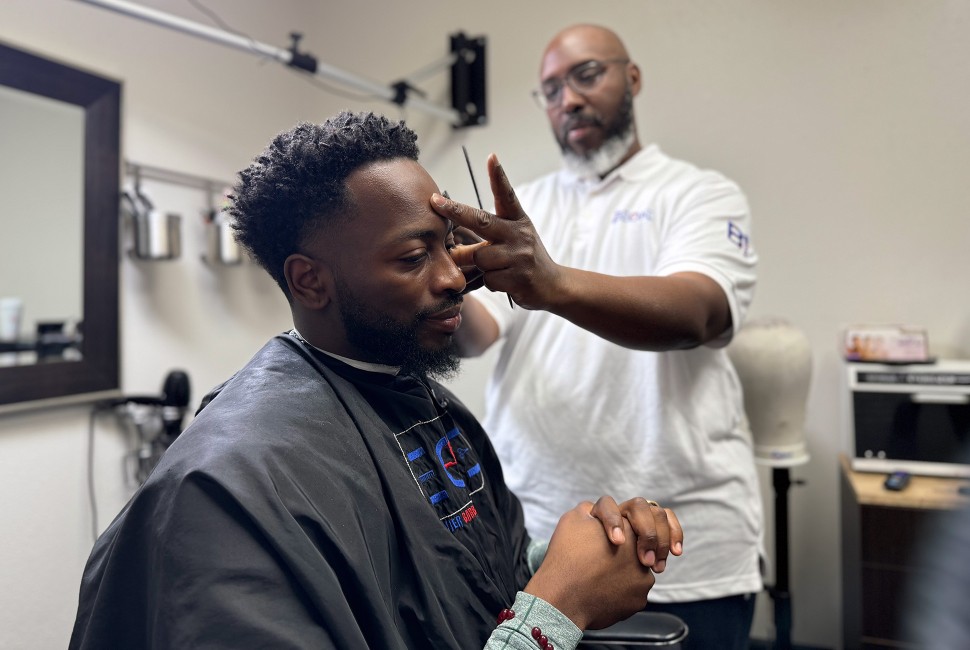Twelve years of friendship and a shared goal to educate and uplift their community has led Northwestern resident physician Dr. Keven Stonewall and his barber, Dorrian “Dee” Whigham, to host an impromptu public health center out of Whigham’s barbershop.
U.S. barbershops have long served as cultural gathering places within the Black community, sites of lively political debates and neighborhood gossip. When Stonewall began visiting Whigham’s South Side Chicago shop for monthly haircuts as a high school student, the two began to talk in-depth about the mistrust many Black Americans feel about the U.S. health care system, formed from a long history of mistreatment and trauma perpetrated by the medical establishment.
“There’s an instant connection with other clients because we come from similar communities,” Stonewall said. “I want to provide education to the community because I recognize that a lot of information was withheld.”
...one little healthy lifestyle change, that’s all it takes sometimes.”
Now a second-year resident in the family medicine specialty at McGaw Medical Center of Northwestern University, Stonewall understands how misinformation prevents his community from seeking care, despite conditions such as heart disease, diabetes and high blood pressure disproportionately affecting Black men, and Black men being nearly twice as likely to die from prostate cancer than other ethnic groups.
Even before he became a resident physician, Stonewall was “Dr. Keven” to shop clients, a trusted source of medical and health information. Stonewall tends to go to the shop hours before his haircut to chat with other clients, asking if they have a primary care doctor, have questions about test results or any other health matter.
By being an accessible and reliable source of information, Stonewall in his off-hours works to debunk myths about COVID-19 vaccines and mental health that persist in some Black communities.
“When I talk to my patients, I always tell them, ‘I’m going to treat you just like I treat my family.’ If I can share information with somebody in the community and help them make one little healthy lifestyle change, that’s all it takes sometimes,” Stonewall said.
Citing years of talks and tips from Stonewall, Whigham said he changed his lifestyle and lost 30 pounds in 2023.
Jaden Blankenship, a high school senior at the Illinois Math and Science Academy (IMSA), learned about “Dr. Kev” during a haircut with Dee while talking about his aspiration to become a doctor. Dee connected him with Stonewall, who has been mentoring him ever since.
“He gave me insight into his personal experiences, and what he thinks other minorities should be aware of as well,” Blankenship said. Stonewall even spoke at Blankenship’s school about being a minority in the field of medicine. “I truly believe that him coming to speak made many students, especially minority students, much more set on going into the medical field.”
Stonewall takes his advocacy even further by posting almost daily videos on his 27,000-follower Instagram account that break down medical jargon or highlight the importance of preventive care.
Stonewall understands how misinformation prevents his community from seeking care, despite conditions such as heart disease, diabetes and high blood pressure.
Whigham’s “family” — as he refers to his clients — also looks to the pair as a resource. Whigham owned a barbershop in Chicago for more than a decade before moving to a smaller space in Bolingbrook, Ill. He said Stonewall was surprised when he learned how much Whigham knew about health through his barber school education.
“Historically, barbers were kind of like the first doctors as well,” Whigham said. “Our fields are intermingled because of the history, where barbers stopped at some point and then the medical field took medicine to where it needed to be.”
Indeed, in Europe during the Middle Ages, the “barber surgeon” was among the most common medical practitioner of the time. Highly skilled with a razor, these early barber surgeons handled numerous tasks in addition to cutting hair, including pulling teeth and amputating limbs. The traditional red and white barber’s pole, said to represent the blood and bandages associated with their bygone role, is considered one of the last remaining visual connections between barbers and physicians.
Ultimately, Stonewall said he hopes barbershops can once again become a center for primary care and information. Perhaps in the future, he said, men would be able to have simple bloodwork done or have their blood pressure read before or after a haircut. From there, people could be better informed heading into doctors’ appointments and have a better sense of their own wellness and health needs.
“Dee has his avenue, and I have mine, and we’re combining our avenues to make it happen,” Stonewall said. “You always want to be the change you want to see in the world.”


